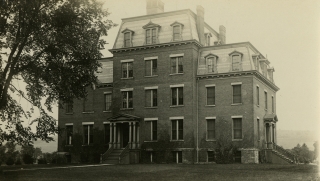tion he indeed earned and proudly bore. He, his brother, Dennis, and some of their associates were campus figures of song and story and many of them faithfully served the University until their well-earned retirement many years later.
The new wind of change brought various improvements to the buildings as well as the grounds. Exteriors were repainted, ventilators installed in classrooms after more than a decade of complaints by students and faculty, and bathrooms, a gift of James B. Colgate, were fitted up in East Hall. As a kind of finishing touch to his efforts, Professor Taylor, in the spring of 1887, planted ivy around Alumni, East and West Halls to hide their bare stones and mortar.
The Boarding Hall, a prominent feature of the old campus, was converted in 1874 into apartments for married theological students and their families since meals were no longer served there because most students now ate in “clubs”, i.e., fraternity or private groups, or boarded themselves in their rooms. Five years later fire destroyed the





